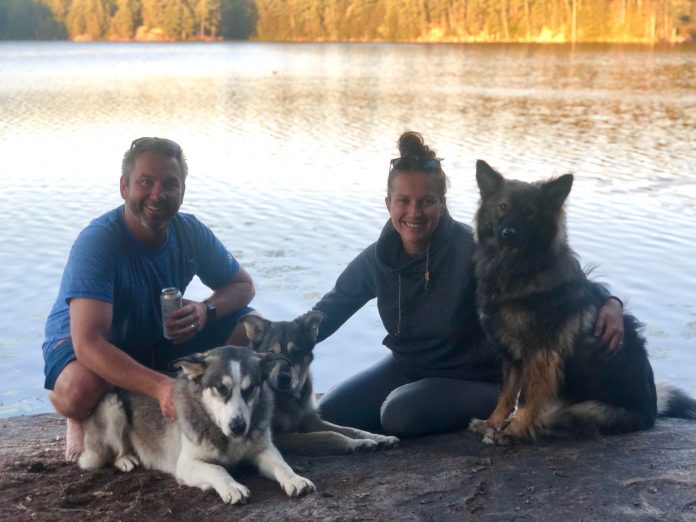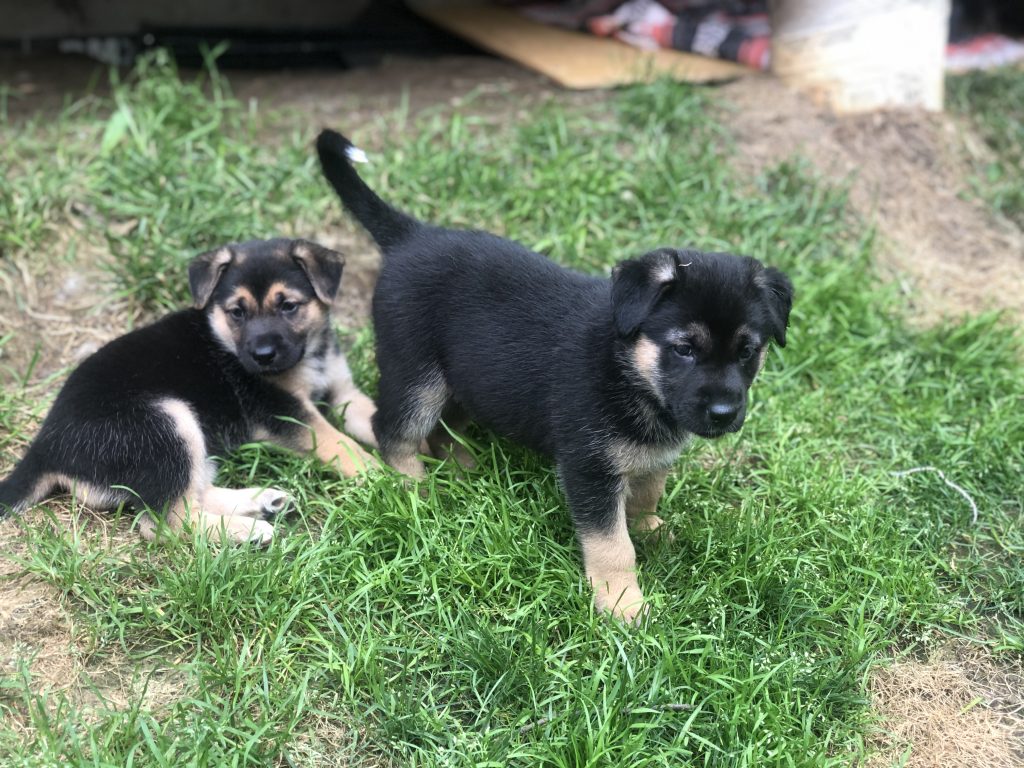
While its not ideal to take on the task of launching a rescue during a global pandemic, Bracebridge’s Holly Marko took on the challenge to help address the “nonstop need” of caring for dogs, and despite the hardships presented by COVID-19, her rescue has rehomed over 65 dogs in just seven months of operation.
Marko launched Paws of the North Rescue alongside her husband Trevor in February, aiming to assist Northern Ontario communities with their dog management. Along with rehoming dogs, it’s important to Marko that the rescue supports dog owners in Northern communities directly by providing food and supplies as well as veterinary clinics that offer spay and neuter services. So far, it’s been difficult to provide that support while also respecting best practices related to COVID-19, but the rescue has sent up some food and supplies and they are continuing discussions with the communities about future spay and neuter clinics.
“When working with these First Nations communities, we are in full support of the community members, understanding that these are their dogs and we’re helping them with their dogs if they ask for our help,” Marko said. “There are unfortunately many unethical rescues working within these communities, and having the trust and relationships that we build and continuing them is our goal at all times.”
Given the location of the communities they support, the rescue often has to coordinate flights to get the dogs into their care, which has created logistical challenges as the pandemic limits flight availability. COVID has also put a strain on their finances, restricting their ability to run fundraising events.

The rescue does not charge adoption fees, but they do ask adoptive families to make a discretionary donation in an amount of their choosing to support the rescue’s continued operations. Because they run on donations alone, fundraising has been a major challenge since they launched, Marko said, but it’s gotten easier over the past few months as they continue to gain a following online.
“We grow in terms of supporters and followers on a daily basis, so if people can even just support us with a small donation, and many do, then it does add up pretty quickly,” she said. “We make it by somehow.”
The rescue is currently running a number of fundraising initiatives, including an online garage sale, a giveaway for a property makeover and trivia nights at Canvas Brewing Co. in Huntsville. Locals can support the rescue’s operations by contributing or buying items for the garage sale, by donating $25 for one entry or $60 for three entries in the giveaway, or by participating in $10 trivia nights.
For those looking to support the rescue in other ways, they’re always looking for volunteers to help transport dogs to the Muskoka area. The farthest destination is the rescue’s northern base in Timmins, but the drive can be split up by multiple volunteers. Along with drivers, the rescue is also hoping to create a network of volunteers to assist the rescue as it grows and expands, especially when it comes to future fundraising events.
The rescue is seeking locals to play a crucial role in their operations by serving as foster families as well. Paws of the North is completely foster based, meaning dogs that come into their care are placed into foster families right away. After the dogs are transported to Muskoka, their foster families pick them up and take them home until they’re ready for adoption. The amount of time they stay with the foster depends on the dog.
“They are placed into our foster family homes, and they remain there until adoption,” Marko said. “That provides us with the opportunity to really get to know these dogs in a family setting [and] provide them with the care and training that they need so that when they go into their forever home, they’re feeling comfortable and more prepared for what’s expected of them and what their new life is.”
The rescue is always in need of foster families because every dog has a specific set of needs, Marko said. If all of the rescue’s available fosters have children or other dogs, they need other fosters that can accommodate a dog that may not be ready to be around kids or other pets.

It’s important for them to have a lot of fosters on hand because they never know when the next dog will come into their care and if they don’t have any available fosters, they can’t accept any dogs. It’s a heartbreaking feeling when there is no one available and there are dogs that need assistance, Marko said, so they’re always working to expand their network.
“People’s lives and lifestyles change throughout the year, so some fosters we have that have been available right from the beginning of us incorporating and others have either got other commitments going on or maybe they foster failed with us, which means that the foster dog never left their home,” Marko said. “It changes all the time, and we’re always looking for foster families because every dog is an individual and every dog requires a specific type of home.”
Marko encourages Muskoka residents to consider fostering because it’s a great opportunity to have a dog in your home without having the financial commitment, as the rescue takes care of all financial responsibility when dogs come into their care. They’re also very hand ons with fosters because they view fosters like adoption, carefully placing dogs into homes that will work for both canine and carer. While there is no definite timeline in place, foster families can expect to house their furry friends for at least a couple of weeks.

“We generally like to give at least two weeks to have the dog in our care before we put them up for adoption,” she said. “Especially with older dogs, there’s a good few days that they need to sort of decompress and just get used to their surroundings before we can really start to see their personality come out, and we’re all about finding perfect matches.”
Time with foster families allows the dog time to unwind and adjust before the rescue starts the search for their forever home, especially since some dogs are used to living outdoors. It also gives the rescue the opportunity to develop the most accurate biography possible for potential adopters, though they always make sure to discuss how rescue dogs’ personalities can change over time or as different triggers come into play.
Marko wants those that may be considering becoming a foster to know that they can trust the rescue to support them throughout the fostering journey. She also wants them to know how meaningful it can be.
“It is such a rewarding experience to see these dogs transform and to start to adjust in the simple things of playing with toys or going for a walk without being fearful, that sort of thing,” she said. “They get over those humps of building that trust with their foster, and our foster families are overjoyed when they see those little changes start to happen and for them to be a part of the team and the process of helping this dog get to where they need to be for their next step in finding their forever home.”
The rescue has an extensive screening process for potential adopters, which has been adapted to suit COVID-19 guidelines. Along with checking references and doing veterinary background checks, Marko and her team have been performing home inspections and having meetings with adoption candidates virtually.

The pandemic has led many people to consider pet adoption, which has resulted in some dogs being returned to other shelters or rescues after being adopted on an impulse, Marko said. The screening process at Paws of the North has allowed them to avoid such a problem, but the influx of applications has presented a challenge to the small team at the rescue.
Despite the many applications they receive, the average time between posting the adoption listing and finalizing the adoption is about five days. Still, Marko asks that those interested in adopting be patient as their team is made up entirely of volunteers.
“We all have families, all have regular jobs, so every effort that we put into this, every sleepless night for dogs, is all volunteer,” she said. “We do ask people to respect that, especially with the applications.”
Though it comes with many challenges, helping Northern communities, meeting dogs and finding them their forever homes make running the rescue beyond worth it to Marko.
“Even on the toughest of days, when those adoption days happen, it really does bring to light just why we’re all doing this and making sure that we’re doing it properly,” Marko said. “It’s quite rewarding.”
For more information about Paws of the North Rescue and how to support their operations, visit their website.







